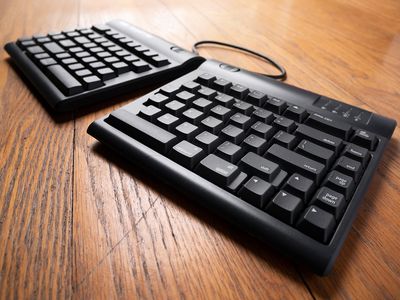
The Enduring Appeal of the Panic Playdate: Insights From Our 2-Year Game Devices Review

The Enduring Appeal of the Panic Playdate: Insights From Our 2-Year Game Devices Review
Key Takeaways
- Playdate is available directly from Panic with a full season of 24 games included.
- The handheld features a compact design, making it easy to hold.
- Hobbyists are able to create their own games which makes the Playdate more useful in the longrun.
Panic’s Playdate has proved to be a surprise hit with gamers and non-gamers alike, offering an approachable low-tech handheld with distinctive crank. Now, more than two years later and over 70,000 handhelds sold, the Playdate is just as charming as ever, although its limitations, purposeful or otherwise, may still give some would-be owners pause.
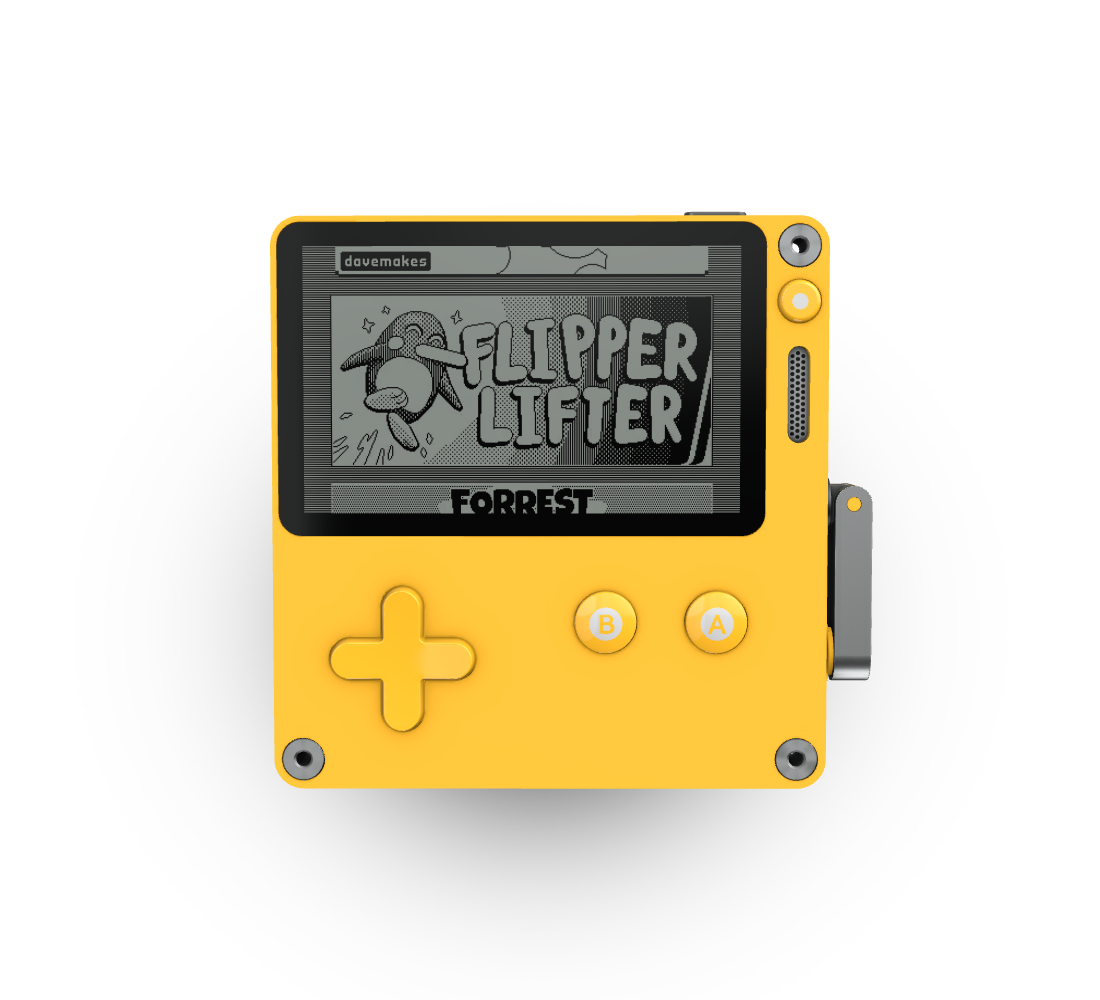
Panic Playdate
7/ 10
Panic Playdate is a tiny handheld game system with reflective screen, new games, and a crank.
Pros
- Quirky game selection
- Display looks great in direct sunlight
- It has a crank
- You can make your own games
Cons
- No backlight for for use in dark places
- Hard to keep screen at ideal viewing angle
- Variable build quality
- Some features and accessories still not available
How We Test and Review Products
Price and Availability
The Playdate is available direct from Panic for $200, or $220 with a cover. In the box is the handheld, USB-C to USB-A cable, and some quick start paperwork. Included with the price is a full first season of 24 downloadable games. Additional games are available for purchase, generally ranging in price from free to $13 each.
Specifications
Screen Size
2.7in
Resolution
400 x 240 at 173ppi
Built-in Games
24
Connectivity
2.4GHz Wi-Fi (b/g/n), Bluetooth 4.2, USB-C, 3.5mm headphone jack
RAM
16MB
Storage
4GB
Power
USB-C
Weight
3oz
Expand
Design: Tiny and Almost Mighty
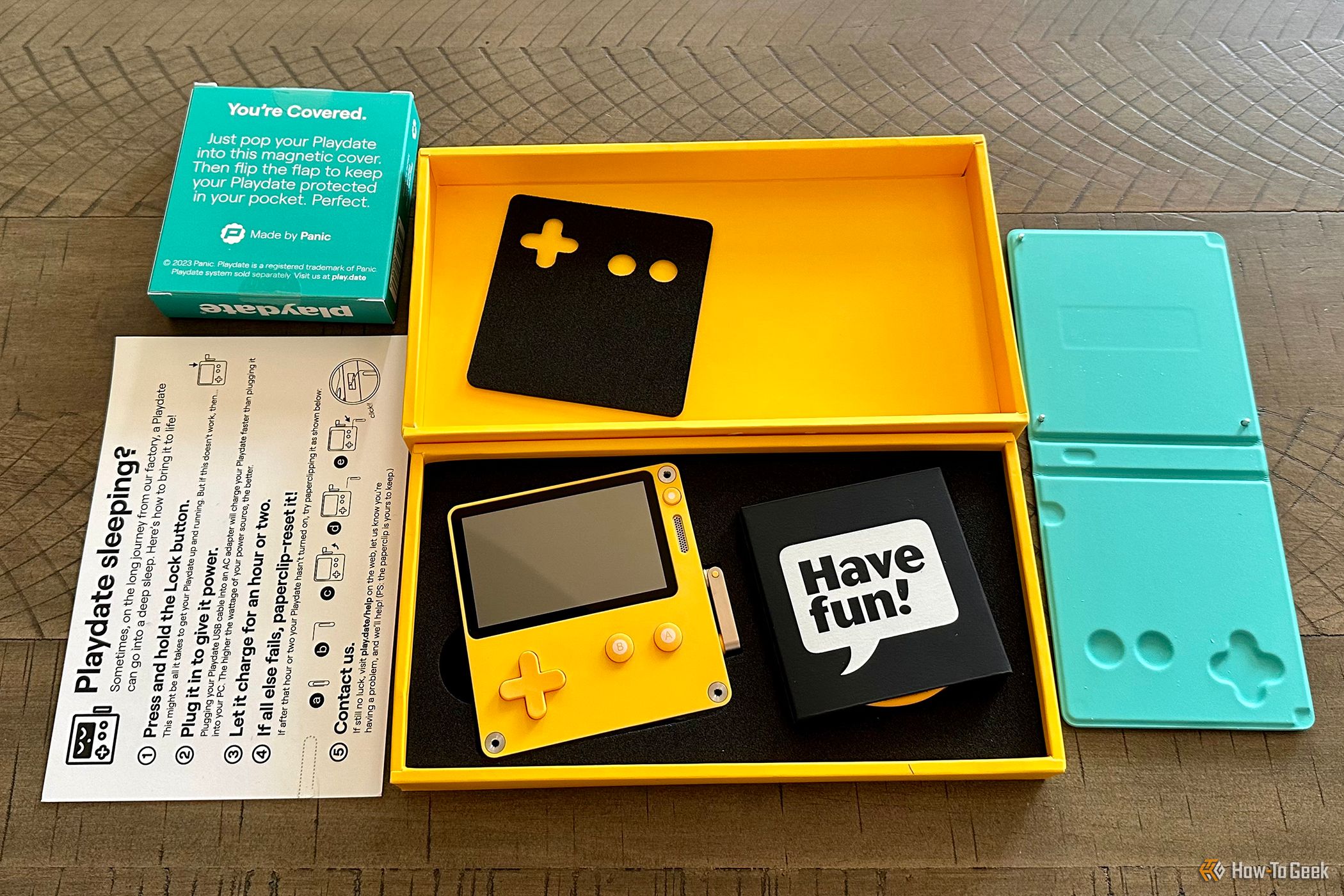
Bill Loguidice / How-To Geek
The Playdate is a compact, rounded square that’s about 2.9 inches around, 0.35 inches thick, and weighing in at 3 ounces. The dandelion yellow color of the casing bears a striking resemblance to one of the variations of the Nintendo Game Boy Color from 1998. Despite its diminutive dimensions, the Playdate’s shape makes it easy to hold, even with larger hands.
Overall, I was impressed with how the Playdate’s compactness made this mostly plastic device feel more substantial. However, on my unit, the top of the case by the lock button had some scratches and it creaked and flexed when pressed, which is a major annoyance for something new out-of-the-box. The rest of the case seemed fine, with no creaks and a generally solid build. I also appreciate that it’s smudge resistant.
Better were the directional pad (D-Pad) and B and A buttons on the front of the Playdate. The D-Pad is a classic plus shape, and, like the buttons, has a soft click when registering a press.
To the right of the 2.7 inch 400 x 240 1-bit LCD is a single mono speaker. On the right side of the Playdate is an analog crank, which is the only other non-digital input besides a built-in 3-axis accelerometer to determine the device’s position and orientation.
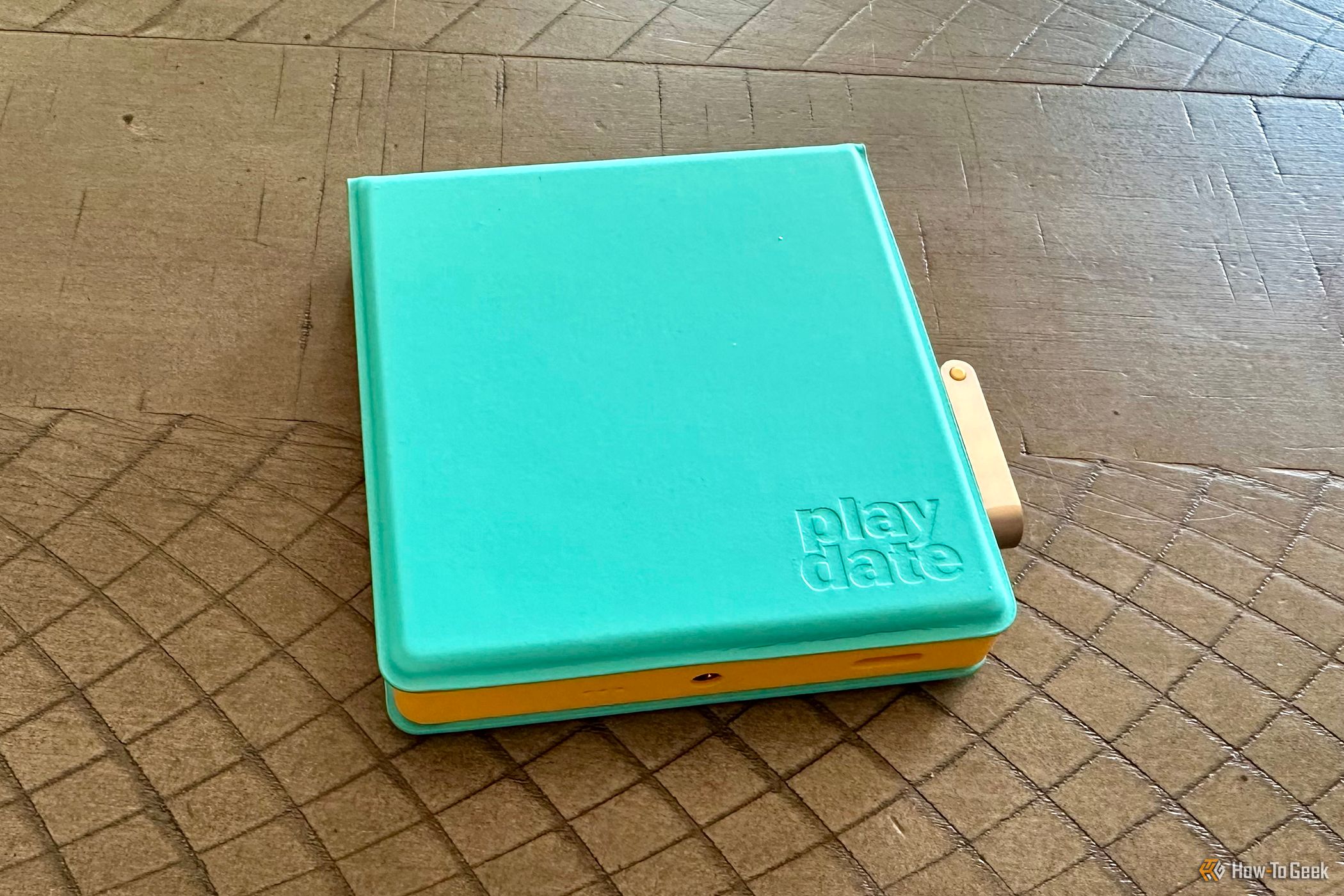
Bill Loguidice / How-To Geek
There are three magnetic screws on the front of the Playdate and four on the back that can attach to the optional Playdate Cover. While the cover magnetically closes, it doesn’t automatically put the Playdate to sleep. That’s controlled exclusively in the settings.
Technical Capabilities and Control: Basic on Purpose
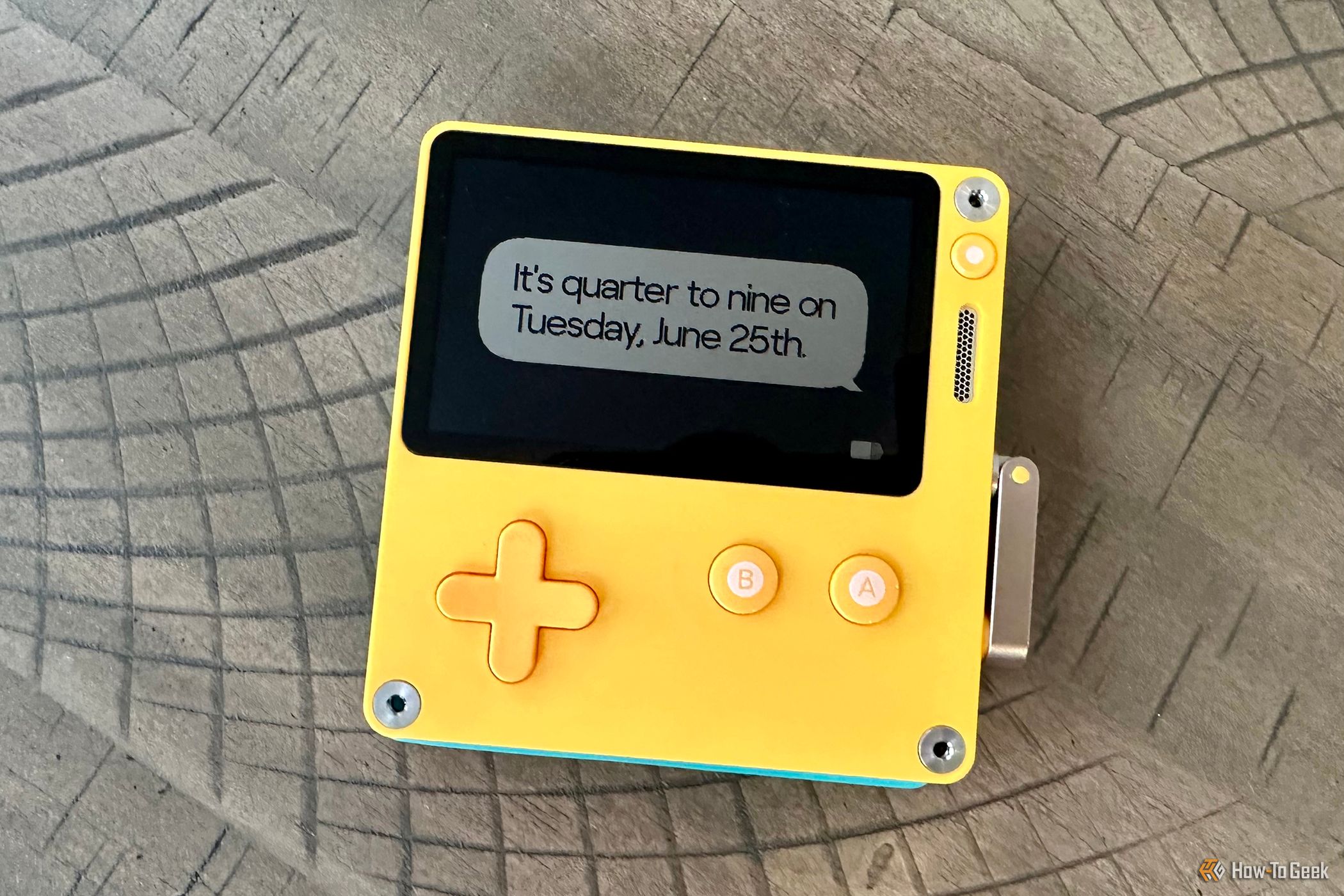
Bill Loguidice / How-To Geek
Outside of the crank, one of the unique aspects of the Playdate is its display, which looks a bit like e-paper, but uses traditional LCD technology for a fast refresh rate. In a surprising move for a modern device, there’s no backlight, so you need to play in a reasonably well-lit area to even see the screen. There’s also no color, just black and white with a dithering technique to simulate grayscale.
Excusing the pun, but where the display does shine is outdoors. Even in direct sunlight, the nemesis of most other types of displays, the Playdate’s screen is perfectly visible, and in fact is the environment where it looks its best. Regardless of the environment, you need to have the device angled just slightly above parallel to catch the best light and point of view.
The single speaker sounds fine and gets quite loud, but does suffer from some distortion at maximum volume levels. If you’re playing a sound-intensive game, you’re better off with headphones. While Playdate does have a Bluetooth chip, it’s not currently supported, and there’s no guarantee that it will be beyond the promised, but not yet available, Playdate Stereo Dock .
To adjust the volume, you need to press and hold the menu button and move the D-Pad to the left or right. It works well, but I still would have been nice to have traditional dedicated buttons or a dial.
The 4GB of non-expandable storage is not much these days, but for storing Playdate games it’s just fine. Even the largest games tend to come in well below 100MB. With that said, should storage space ever become an issue, uninstalling games and deleting their game data is quick and easy from the settings menu.
Even with the Playdate’s tiny size, thanks to its modest specifications, battery life is quite good. You’ll get up to 8 hours of active play, or up to 14 days in standby mode using it as a clock. It fully charges in a few hours as well.
Navigating the user interface is easy, as you can use either the D-Pad or crank, with the A button selecting options and the B button going back. You can purchase games either from the website or directly on the device. Games from every genre, as well as simple productivity apps like a talking pocket calculator, are available via the catalog option.
One neat feature of the user interface is a built-in screenshot capability. Pressing the device’s menu button and selecting screenshot takes an image of the screen. To access the images, however, you have to reboot the Playdate into data disk mode, plug the USB cable from the Playdate to your computer.
Games and Gameplay: Cranked Up Fun
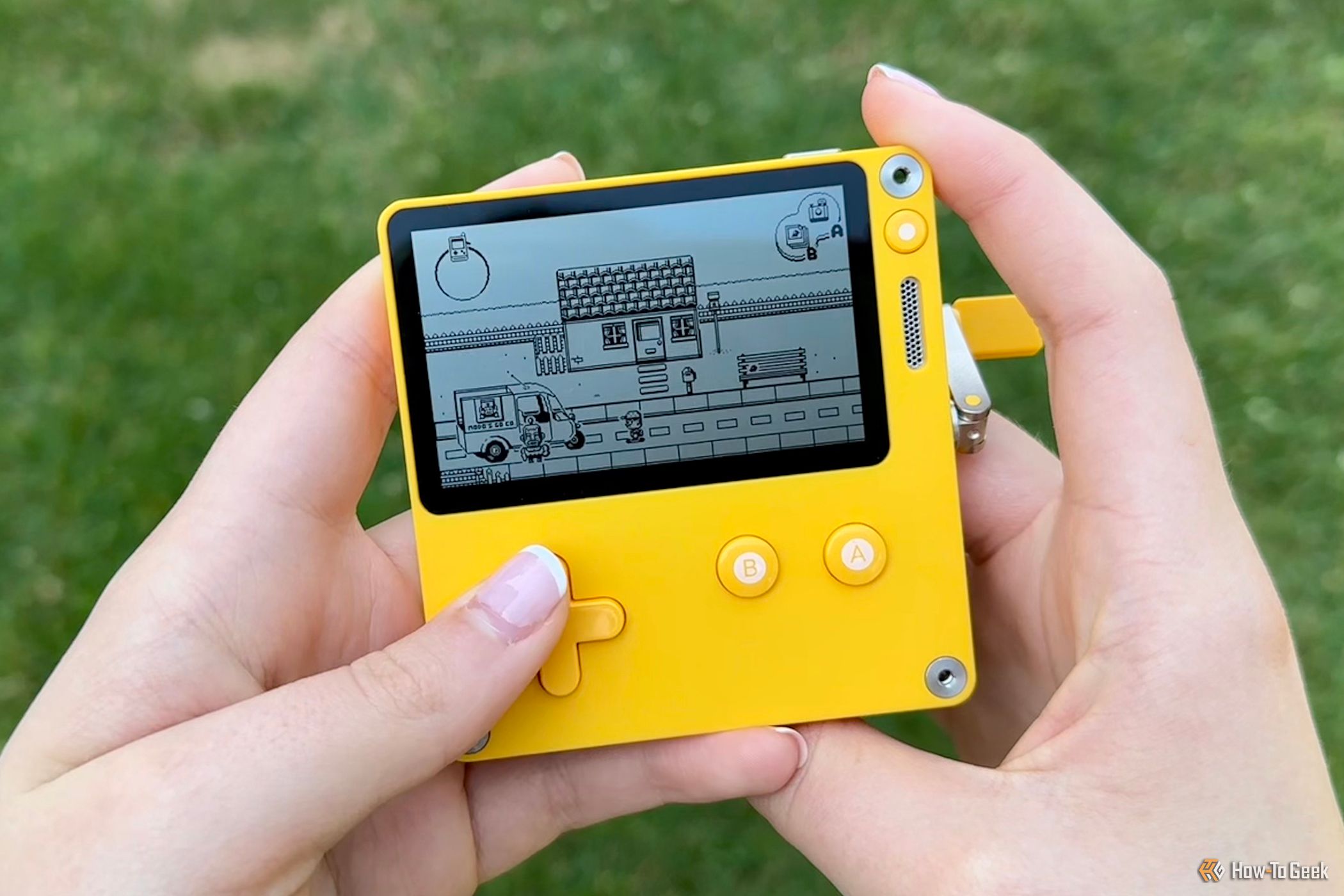
Bill Loguidice / How-To Geek
What’s interesting about the Playdate season concept is that games are meant to be rolled out on a two games per week schedule, giving you a chance to really play what you have before moving onto something else. For example, “Whitewater Wipeout “ and “Casual Birder “ are unlocked first and are solely available until the following week, when “Crankin’s Time Travel Adventure “ and “Boogie Loops “ are unlocked.
As the weeks wear on, you’ll eventually have access to all 24 games from Season One. Of course, you can also simply login to your account on the website, select Devices, and modify the season schedule to your liking, including simply downloading all games at once.
Both “Whitewater Wipeout” and “Casual Birder_”_ are good introductions to the Playdate, as they make varying degrees of use out of the D-Pad, two action buttons, and crank.
Just like the legendary mini game included with Epyx’s “California Games ,” “Whitewater Wipeout_”_ casts you as a surfer trying to ride a wave and perform tricks. You turn the crank to maneuver your surfer in an absolute position, meaning up for up, down for down, toward you to turn left, and away from you to turn right. Just before you crest a wave, you hold up on the D-Pad to get more air, and, once in the air, move the D-Pad left or right to snap the board in that direction. It’s a challenging game that requires precision use of the crank—you’ll wipe out a lot—but it also has pleasing visuals and just-one-more-try appeal.
Close
“Casual Birder“ is a much easier game where you’re tasked with exploring eight different environments to find birds to photograph. The D-Pad is used for movement, the A and B buttons for different actions, and the crank to make the camera focus, as well as other puzzle-specific uses. It’s a fun time, but the visuals do reveal some of the Playdate’s limitations. For instance, because of the detailed graphics on the tiny display, it can be hard to make out some of the in-game elements, like text on objects or where there’s actually a bird.
Again, just about every genre is represented in the Playdate’s catalog, and the included Season One games do a good job of reflecting that with puzzle games, shooters, racers, adventure games, sports games, RPGs, rhythm games, and more. Not every game is a winner, but every game included in Season One does try to offer something interesting for the platform, giving you something to look forward to each week. For instance, the charmingly silly week two game, “Crankin’s Time Travel Adventure,” exclusively uses the crank to advance or rewind the titular character’s timeline to jump over or duck under enemies so he’s not too late for his date with Crankette, and is quite unlike anything else you’d find on other platforms.
Side Loading, Mirroring, and Making Your Own Games
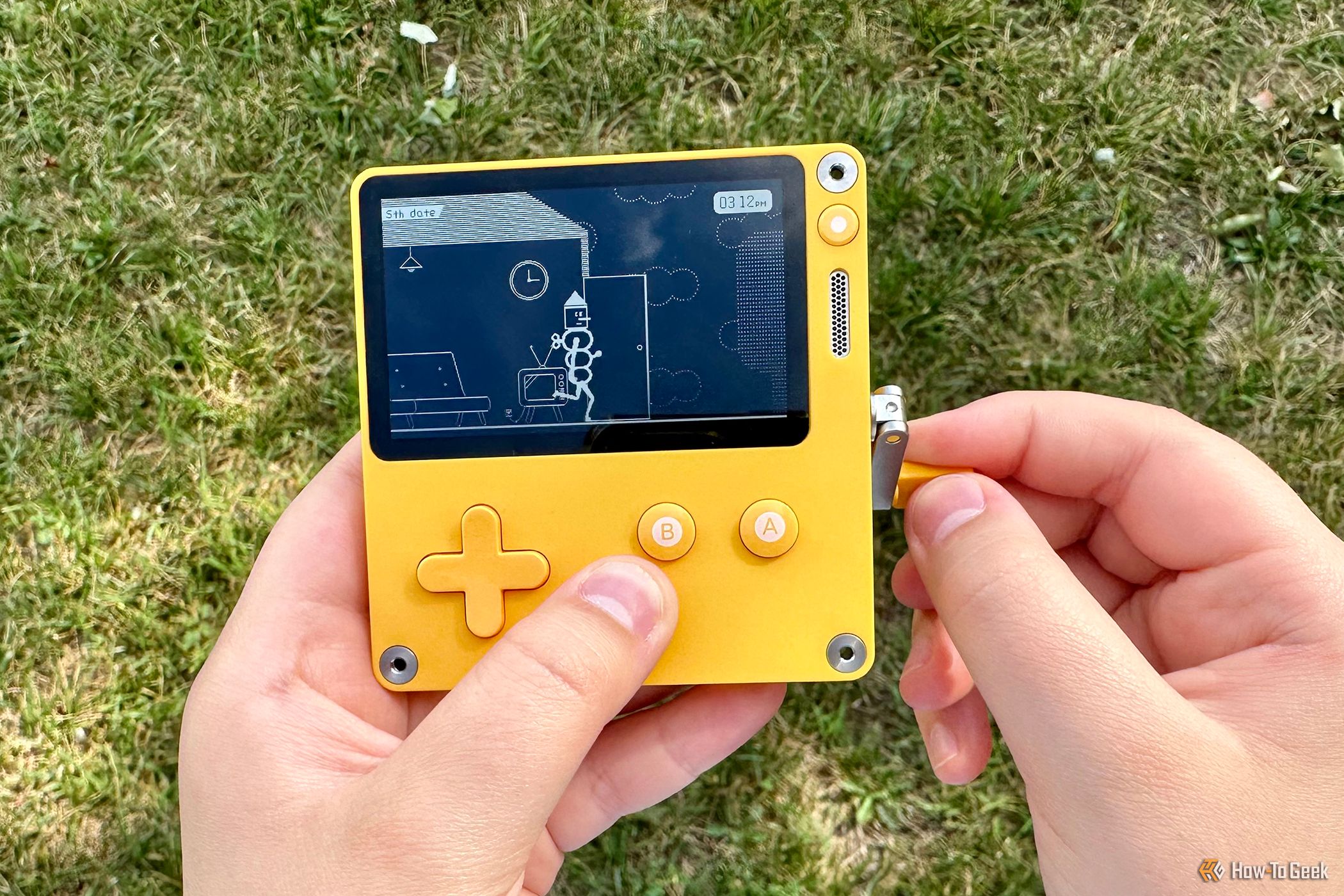
Bill Loguidice / How-To Geek
While Playdate is designed to be as simple as possible out of the box, there are some advanced options that can be worth exploring. You can easily buy more games from the catalog , but you can also side load games from other sources either over USB with a PC or wirelessly through the website. These other sources can be from anywhere, but one of the more popular places for developers to upload their creations to is itch.io . Prices there generally range from free to $10.
“Mirror “ is an app that streams gameplay video and audio in real-time from a Playdate to a Windows-, Macintosh-, or Linux-based PC. While it’s primarily meant to mirror your Playdate’s display, it also gives you an alternate means of controlling the games, like with a gamepad or mouse. While “Mirror”loses some of the charm of playing on the actual handheld, it’s nice to have the option to play some of these games on a larger screen or with different controls, and further justifies the investment in more games for your personal library. I was also impressed by the lack of any noticeable lag between what was done or displayed on the Playdate versus what showed on my Windows 11 PC’s monitor in the app.
Close
Finally, there’s the powerful ability to make your own games. If you’re an experienced developer, you can use the Playdate SDK for Windows-, Macintosh-, or Linux-based PCs, which includes a Playdate Simulator, or, use the simpler browser-based Playdate Pulp . Pulp allows you to create Playdate games in a much more intuitive manner and has pixel art, chiptune music, and simple logic scripting built-in.
Two Years Later and the Future Prognosis
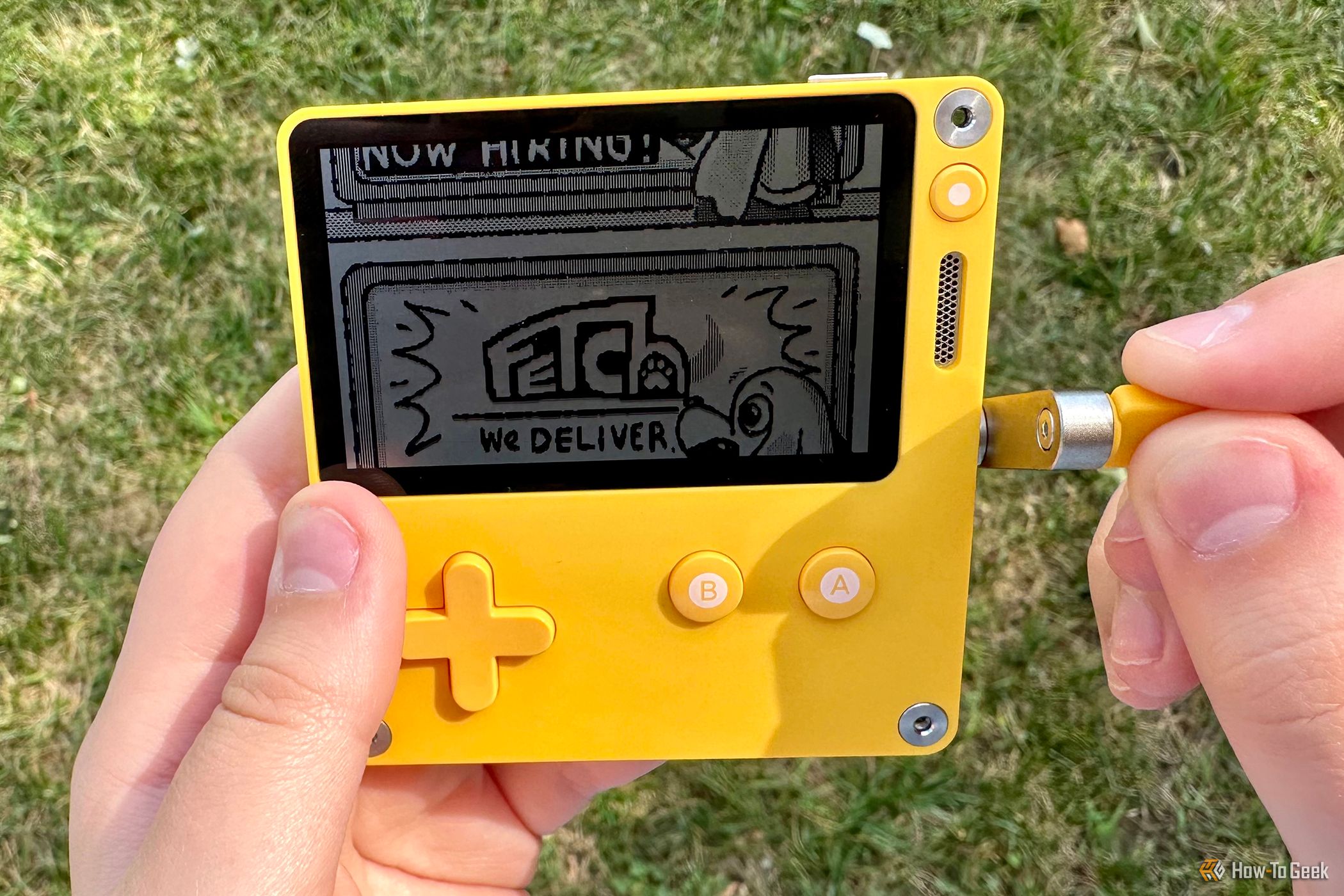
Bill Loguidice / How-To Geek
At just over two years since launch, the Playdate has no real surprises left. What you see now is likely what you’ll get if you buy it at any point in the foreseeable future. There’s still a chance that the Playdate Stereo Dock will come out and that the Bluetooth functionality will see at least partial use, but it’s best to keep those particular expectations in check.
What you can count on are the 24 built-in games and access to more both direct from Panic and, via side loading, from outside sources. Since the barrier to creating content is low, you can expect some low quality content mixed in with the gems, but it’s nothing if not a platform for experimentation. Along those same lines, even if there’s never a Season Two of games and Panic just sticks to individual releases, there’s always probably going to be hobbyists making new content.
Of course, with the right motivation, you can also use Panic’s free SDK or the Pulp game maker to create your own games or apps, opening up even more possibilities. As with the hardware and games themselves, the Playdate is just different enough, and open enough, to stand on its own merits, regardless of how much more time passes and what other companies may come out with.
Should You Buy the Panic Playdate?
The Panic Playdate is something of a paradox. For the price, I’d really like something that feels just a bit more premium and substantial. On the other hand, Panic has gone all in on a very compelling, and open, concept. The Playdate proves to be a fun and approachable gaming device unlike anything else in the modern era. At just over two years on, that remains the beauty of the Playdate. No matter how much technology advances, or what other gaming platforms offer, the Playdate’s core concept of fun, simple games, as well as that irresistible crank, are timeless.

Panic Playdate
7/ 10
Panic Playdate is a tiny handheld game system with reflective screen, new games, and a crank.
Also read:
- [New] In 2024, Maximize Youtube Income Insights and Techniques
- [New] Strategic Sound Shifts Winning with Words in Free Fire
- [New] Unlocking Skype's Full Capacity with Effective Zoom Methods
- [New] Which Action Camera Takes the Crown ? GoPro Vs. YI for 2024
- [Updated] 2024 Approved Innovative Designs Unleashed Comprehensive Guide to Animation Suites
- [Updated] Learn Everything About 3D LUT Creator & Mobile App
- 2024 Approved Tune Into Trends Integrating Songs with Reels
- Android to Apple How To Transfer Photos From Oppo K11 5G to iPad Easily | Dr.fone
- Bluetooth Beats on Wheels: The Economical Trucker's Audio Gadget Guide
- Comprehensive Guide to Resolve Firefox Stuttering Issues
- In 2024, 8 Ways to Transfer Photos from Vivo Y100t to iPhone Easily | Dr.fone
- In 2024, How To Fake GPS On Oppo F25 Pro 5G For Mobile Legends? | Dr.fone
- In 2024, How to Turn Off Google Location to Stop Tracking You on Xiaomi Redmi Note 12 5G | Dr.fone
- Title: The Enduring Appeal of the Panic Playdate: Insights From Our 2-Year Game Devices Review
- Author: Edward
- Created at : 2025-01-13 19:13:16
- Updated at : 2025-01-17 18:33:46
- Link: https://vp-tips.techidaily.com/the-enduring-appeal-of-the-panic-playdate-insights-from-our-2-year-game-devices-review/
- License: This work is licensed under CC BY-NC-SA 4.0.